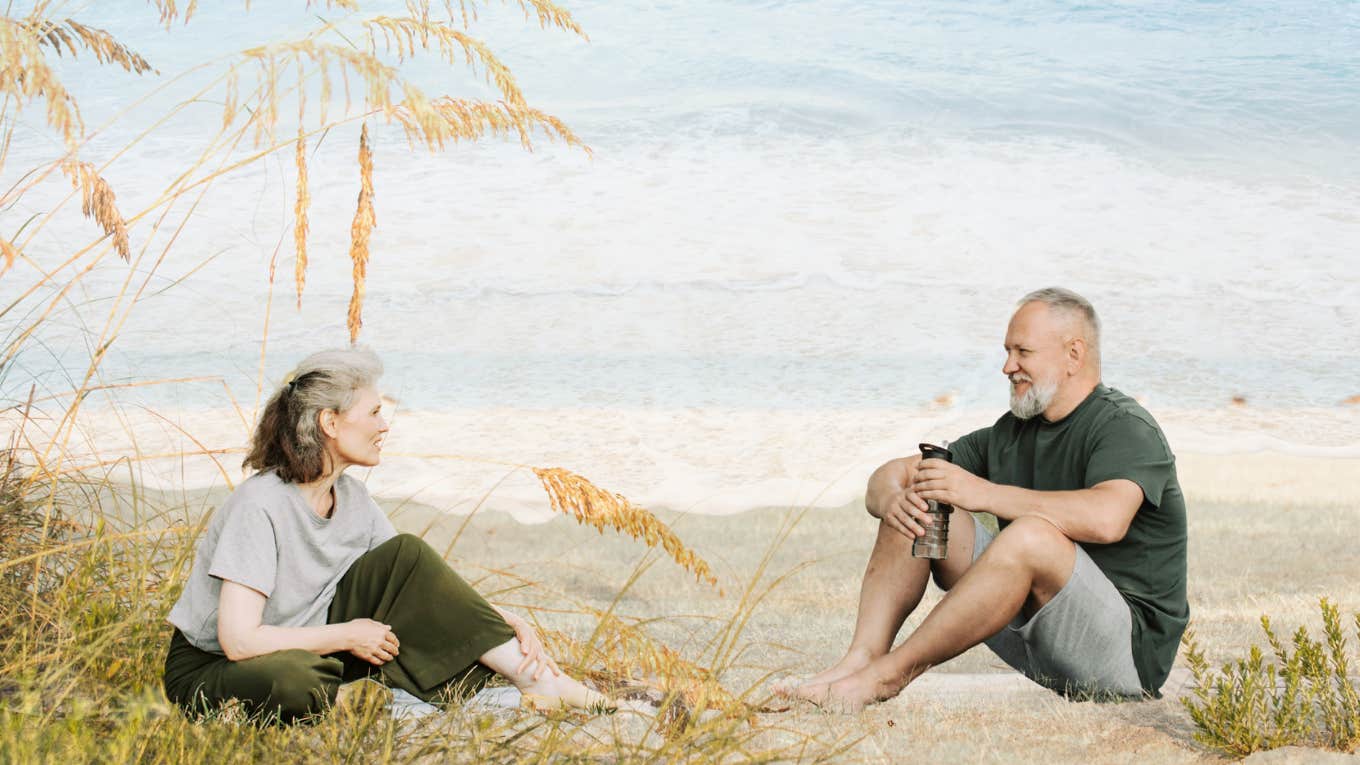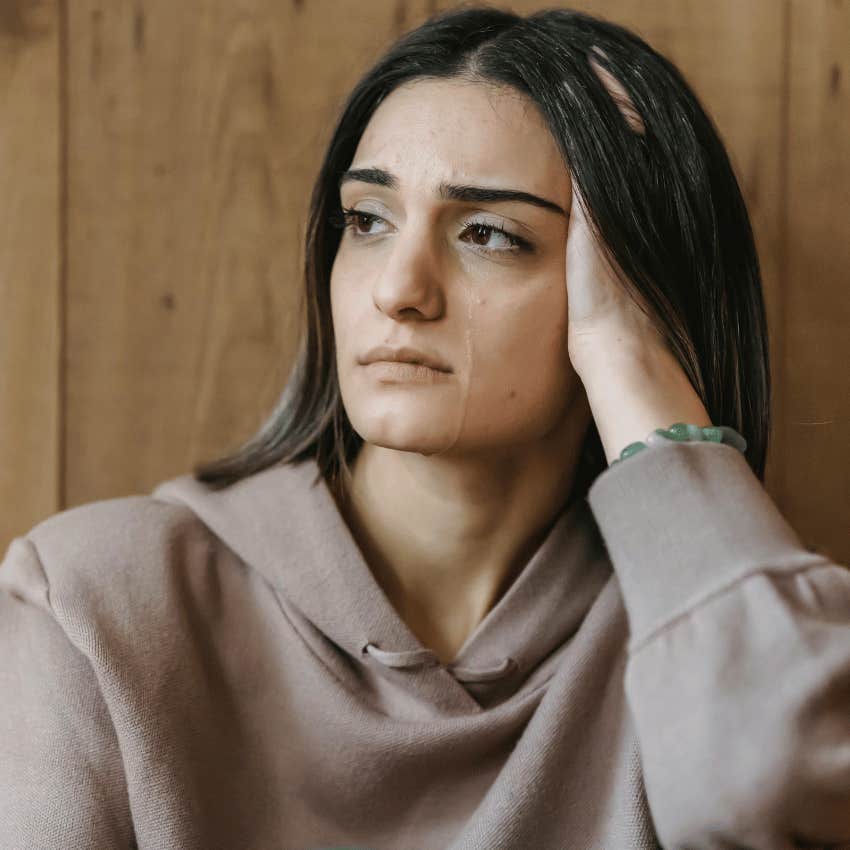Coming Full Circle In My Marriage After A Devastating Betrayal — 'It Was Like Learning To Ride A Bike After A Bad Fall'
I thought my marriage would follow a straight line, but I was wrong.
 vlada karpovich | Pexels, KellyJHall, iamzereus | Canva
vlada karpovich | Pexels, KellyJHall, iamzereus | Canva It is late afternoon, and the beach is emptying. Parents are coaxing unwilling children. People are lugging paraphernalia that seems heavier now than when they arrived full of enthusiastic energy. I relish this time.
At rest, I can finally see the waves that have been obscured all day by the crowd. The ocean is complicated. It is not just blue or green. Instead, it is a swirl of colors that have no names. Each arc of water as it breaks upon the shore is different.
There are smooth waves, calm, rhythmic, and predictable. But then, offshore brews a power that rises and smashes the sand. They always surprise me. I can’t predict the gentle waves or the ferocious water.
There is a stirring next to me. My ex-husband shifts in his chair. He squints in the sunlight and smiles at me. There is no talking. I imagine he is lost, as I am, in 50 years' worth of memories of ocean and shore, sun and salt — all the way back to when were 16 and fell in love with the beach before we fell in love with each other.
As the sun begins its lazy orange-purple descent, I am aware that this beach time has been absent in my life for seven long years. There was no sitting beside each other, no smiling and squinting. The ocean I once loved turned dark and mean. With the force of a hurricane, it ripped through my life and myself. And my marriage.
One night, my husband announced precipitously that he was in love with another woman, and that he was leaving me and moving in with her.
 Liza Summer | Pexels
Liza Summer | Pexels
It was a done deal. A nuclear bomb that hit without an alarm. I was decimated. I just didn’t see it coming. And while we weren’t in the most exciting phase of our marriage, things were fine. My husband was typically a kind, affectionate man. He was an incredible father.
I was confused. I felt erased. I thought I was dying. Every night I waited till my daughter was asleep and then I crumbled in the darkness until the burdens that came with the sunlight would arrive. All day I had to struggle with pretending to be in tune with what was going on and having to resist the constant loops — of the magic times and the horrific ones.
After months of limping along like a wounded animal, I entered the world of rage. My fury at the actual infidelity was topped by the fact that he was living with her and her adolescent daughters. I was infuriated and targeted my rage on my husband's mistress. I didn't even know her name.
But I felt like she had transgressed the “sisterhood,” especially the sisterhood of “motherhood.” In a million years, I would never do that. But no, she, a single mother of adolescent girls turned me into a single mother of an adolescent girl with no empathy for my daughter.
As I calmed down and was able to reflect on something besides confusion, pain, and anger it became clear to me that even though she’d never admit it, my daughter needed her father. As easy and selfishly satisfying as it would be to fan the flames of her anger and total estrangement, I just couldn’t do it. I knew he was in agony in this situation.
Rising
I spoke with my husband about his need to get back into our daughter's life. In an incredibly slow process, he and I talked on the phone about her, and then general small talk about his family and his work. Month by month, she began to thaw, especially when she found out he rescued a dog. Lucky became the tentative conduit through which he crossed the threshold of our apartment.
I was still stumbling. And I was tormented with why. I saw a therapist. My husband joined us in two early sessions. I thought he was going to faint, he looked so frightened. (This would probably be a good time to say we are both psychotherapists). But my therapist was clear that it was not couples therapy, that she just wanted to get some context.
We took turns telling the history of our relationship from our teenage years to early marriage, graduate school, baby, careers, lost babies, great friendships, and close families. We almost glossed over my severe depression that began in my thirties. Whether they were accompanied by manias or agitation is a clinical question, but they were horrible times. I became a ghost in the house and required hospitalization several times.
She focused in on how the household kept going, and how our daughter continued to flourish. It was because of him. He held everything together.
 fizkes | Shutterstock
fizkes | Shutterstock
Understanding
My husband became less of a bad person and more of someone who did a bad thing. My therapist said to me, “I don’t think your marriage is over.” I was infuriated. She said, “Your husband is a born caretaker. He wants to make everything better, at his own expense.” I almost quit my therapist right then.
And then she added, “I don’t think this was just some midlife thing.” She sat in silence to let me absorb the bombshells. My husband had carried me. He saved my life. What must it have been like for him? What about one episode after the next episode? I was always grateful, but that didn’t mean I truly understood.
Let’s say that she and I had a lot to talk about over the next months. Almost imperceptibly he and I moved towards each other. We reclaimed our booth at our old deli and had the usual blueberry pancakes on Monday mornings. Afterward, we called our daughter, who had moved to Sweden with her fiancé.
We didn’t have deep dark talks about our marriage. It was like learning to ride a bike after a bad fall. It's not in the talking. It's in the muscle memory, in the trust in the balance of motion, and the hope that the learning will come.
Divorce
All of the material qualifying us for our divorce arrived. I think both of us thought the other was still committed and didn’t want to confront the rejection. I was okay with it. I had learned so much about myself. I had learned to live alone. I knew I would be all right.
Several months after our divorce, he was sick and tired of his mistress (some habits die hard). He planned to move out but had practical and financial issues prohibiting it. It just came out of my mouth: “You can rent our daughter's old room while you get things organized.”
He took me up on it. He and his dog Lucky. It wasn’t weird. He cooked. We watched TV at night. We talked and laughed. We confounded our families. Eventually, I put him on my lease.
And just as suddenly as sh-tty things happen, the skies opened up and we were enveloped in goodness and surprise. We were offered a place to rent in a beach town, two miles from the water. Conjuring up our early years at the beach, it took us less than an hour to decide. In our 70s, this would likely be our last move.
We were flying by the seat of our pants. I still hadn’t forgiven him. But I’m not sure forgiveness is an all-or-nothing enterprise. About 12% to 25% of married couples report breaking up and getting back together, says J. Kale Monk, Ph.D., an associate professor at the University of Missouri College of Education & Human Development who researches relationship quality and instability. That’s often in the form of a trial separation, but it can also be people divorcing and reconciling, he adds.
Moving
We dove into the Big Move with enthusiasm which quickly turned to irritation. And anxiety. And a major test of wills. We fought about everything — the store that carries the best boxes, what to save, and what to throw away. With each fight, we grappled with whether this was our destiny.
I had nights where I ached all over and hated his guts. He said he didn't remember me as being such a nag. They were the fights we had to have. Amid the chaos, we had to stop being polite.
As the condo came together, so did we. It was a combination of old junky stuff we’d had since our wedding and some gorgeous white leather matching chairs that make me gasp each time I walk into the living room. We have matching blue rocking chairs on our small porch that look out into the woods, a change from our more congested surroundings.
And perhaps the greatest bond is one of grandparents. Every morning after we down our coffee, we FaceTime our daughter, and our miracle granddaughter who has taken to the technology. My husband sings “Old McDonald Had a Farm,” and she chortles. Sweden is so far away. When we sign off, we sigh in a combination of wistfulness at the distance and joy at her existence.
 Himanshu Gupta | Pexels
Himanshu Gupta | Pexels
Beach
Late in the afternoon, we come together again. We work hard to pull the cooler and the chairs. Were they always this heavy or are we getting weaker? We always forget something and try to blame it on the other person.
We negotiate about the best place to sit. It’s a production. But then we settle. We sit in our chairs and dig them into the sand. We cast our view across the horizon and nod to each other.
We made it here. It was once really good. Then it was terrible. And now here we are.
Martha Manning PhD is a clinical psychologist and writer. She has published five books, written for the New York Times, the Washington Post, Readers Digest, Psychotherapy Networker, Ladies Home Journal, and Harpers Bazaar, and written 400 stories for Medium. She has been featured in People magazine and USA Today. With Mike Wallace and William Styron, she was featured in the Emmy-nominated HBO documentary, Dead Blue.

